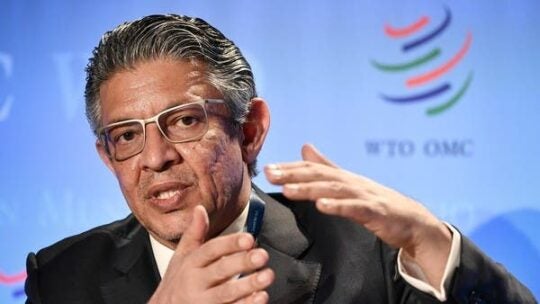WITA Webinar Featuring:
HE Mohammad M. Al-Tuwaijri, Former Minister of Economy and Planning for Saudi Arabia and WTO Director General Candidate
Ambassador Rufus Yerxa, President, National Foreign Trade Council, and former Deputy Director General of the WTO
Wendy Cutler, Vice President, and Managing Director, Washington D.C. office of the Asia Society Policy Institute
HE Mohammad M. Al-Tuwaijri was the Minister of Economy and Planning for Saudi Arabia from 2016 until 2020. His priorities as a Minister have been to foster the Saudi economy through a comprehensive economic reforms, policies, strategic planning and regulations to achieve the Kingdom’s diversification objectives including removing obstacles to productivity and competitiveness. He has focused on strengthening the integration of SMEs into the local and global economy; encouraging privatization and PPP; and enhancing regional and international cooperation with trading partners and relevant stakeholders based on best standards to promote trade, and leverage on best practices to achieve economic prosperity and sustainability.
While focusing on the realization of Saudi Vision 2030 and the National Transformation Program, he was keen to strengthen policy research and analysis that will better position the economy of the Kingdom to support the evolving trade and investment policy environment.
As a strong advocate to the UN SDGs (Sustainable Development Goals) and to economic growth and social development, he has spared no efforts to establishing the NDF (National Development Fund) which now have under its umbrella seven national funds. Namely, real estate development fund, Saudi industrial development fund, Saudi agricultural fund, Saudi fund for development, Saudi tourism fund, human resource development fund, and Social development fund.
From 2010-2016, he served as the Group Managing Director, Deputy Chairman and CEO of HSBC Bank Middle East and North Africa. He led as a regional chief Executive Officer with a coverage includes the following countries, Saudi Arabia, UAE, Kuwait, Bahrain, Qatar, Oman, Jordan, Egypt, Algeria, Morocco, Turkey, Iraq, and Pakistan. Ramallah. He dealt with more than 30 regulators including central banks, capital markets authorities, tax authorities and ministries of trade.
Prior to 2010, he was the Managing Director and CEO of J.P. Morgan Saudi Arabia. He established the bank operation bottom up, starting alone initially and ended up with one of the most profitable global entities in the kingdom with a reputable client base including almost all of the GREs and MNCs operating locally. He also led major capital market transaction like the mining company Ma’aden IPO and a major secondary offering of Saudi Mobily Co. a telecom operator owned by UAE Etisalat.
HE Al-Tuwaijri has a Bachelor’s degree from the King Faisal Air Academy, and an MBA from King Saud University.
Ambassador Rufus Yerxa became President of the National Foreign Trade Council (NFTC) in May 2016. As president, he oversees NFTC’s efforts in favor of a more open, rules-based world economy, focusing on key issues to U.S. competitiveness such as international trade and tax policy, economic sanctions and export finance.
He has more than four decades of experience as a lawyer, diplomat, U.S. trade negotiator and international official. He has been in key policymaking and management roles in Congress, the Office of the United States Trade Representative (USTR) and the World Trade Organization (WTO), and also spent several years in private law practice and the corporate world. As Deputy Director General of the WTO from 2002 to 2013 he helped to broaden its membership and strengthen its role as the principal rules-based institution governing world trade.
Prior to this, from 1989 to 1995, he served as Deputy USTR under both a Republican and a Democratic President, first as the Geneva-based Ambassador to the GATT (the predecessor organization to the WTO) and subsequently as the Washington Deputy. Earlier in his government career (1981 to 1989) he was with the Committee on Ways and Means of the U.S. House of Representatives, where he was Staff Director of the Subcommittee on Trade. He began his government career as a legal advisor with the U.S. International Trade Commission. After leaving government service in 1995 and prior to joining the WTO he spent five years in the private sector, including as the Brussels-based partner with the U.S. law firm of Akin Gump Strauss Hauer & Feld. Rufus is a native of Washington State.
He holds a BA in political science from the University of Washington (1973), a JD from Seattle University School of Law (1976) and an LLB in international Law from the University of Cambridge in England (1977). He is a member of the District of Columbia Bar, and is also a Visiting Professor with the Middlebury Institute of International Studies at Monterey (MIIS).
Wendy Cutler joined the Asia Society Policy Institute (ASPI) as vice president in November 2015. She also serves as the managing director of the Washington D.C. Office. In these roles, she focuses on building ASPI’s presence in Washington — strengthening its outreach as a think/do tank — and on leading initiatives that address challenges related to trade and investment, as well as women’s empowerment in Asia. She joined ASPI following an illustrious career of nearly three decades as a diplomat and negotiator in the Office of the U.S. Trade Representative (USTR).
Most recently she served as Acting Deputy U.S. Trade Representative, working on a range of U.S. trade negotiations and initiatives in the Asia-Pacific region. In that capacity, she was responsible for the Trans-Pacific Partnership (TPP) agreement, including the bilateral negotiations with Japan. She also was the chief negotiator to the U.S.-Korea (Korus) Free Trade Agreement.
Cutler received her master’s degree from Georgetown University’s School of Foreign Service and her bachelor’s degree from the George Washington University.

